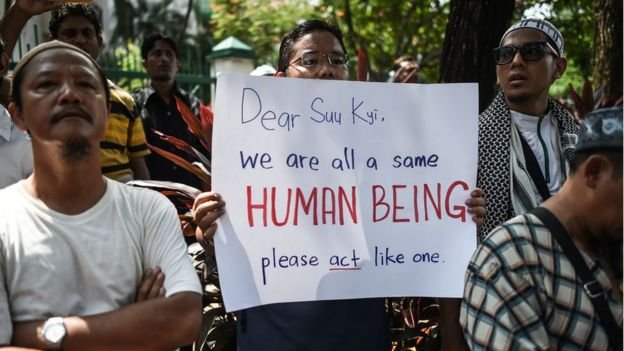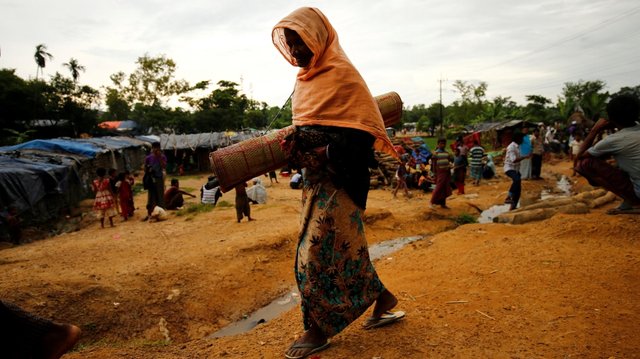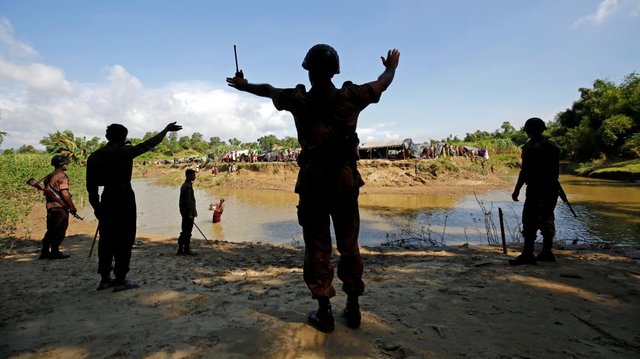
The Rohingya are often described as "the world's most persecuted minority".
They are an ethnic Muslim group who have lived for centuries in the majority Buddhist Myanmar. Currently, there are about 1.1 million Rohingya Muslims who live in the Southeast Asian country.
The Rohingya speak Rohingya or Ruaingga, a dialect that is distinct to others spoken in Rakhine State and throughout Myanmar. They are not considered one of the country's 135 official ethnic groups and have been denied citizenship in Myanmar since 1982, which has effectively rendered them stateless.
Nearly all of the Rohingya in Myanmar live in the western coastal state of Rakhine and are not allowed to leave without government permission. It is one the poorest states in the country with ghetto-like camps and a lack of basic services and opportunities.
Due to ongoing violence and persecution, hundreds of thousands of Rohingya have fled to neighbouring countries either by land or boat over the course of many decades.
Where are the Rohingya from?
Muslims have lived in the area now known as Myanmar since as early as the 12th century, according to many historians and Rohingya groups.
The Arakan Rohingya National Organisation has said, "Rohingyas have been living in Arakan from time immemorial," referring to the area now known as Rakhine.
During the more than 100 years of British rule (1824-1948), there was a significant amount of migration of labourers to what is now known as Myanmar from today's India and Bangladesh. Because the British administered Myanmar as a province of India, such migration was considered internal, according to Human Rights Watch (HRW).
The migration of labourers was viewed negatively by the majority of the native population.
After independence, the government viewed the migration that took place during British rule as "illegal, and it is on this basis that they refuse citizenship to the majority of Rohingya," HRW said in a 2000 report.
This has led many Buddhists to consider the Rohingya as Bengali, rejecting the term Rohingya as a recent invention, created for political reasons.

How and why are they being persecuted? And why aren't they recognised?
Shortly after Myanmar's independence from the British in 1948, the Union Citizenship Act was passed, defining which ethnicities could gain citizenship. According to a 2015 report by the International Human Rights Clinic at Yale Law School, the Rohingya were not included. The act, however, did allow those whose families had lived in Myanmar for at least two generations to apply for identity cards.
Rohingya were initially given such identification or even citizenship under the generational provision. During this time, several Rohingya also served in parliament.
After the 1962 military coup in Myanmar, things changed dramatically for the Rohingya. All citizens were required to obtain national registration cards. The Rohingya, however, were only given foreign identity cards, which limited the jobs and educational opportunities they could pursue and obtain.
In 1982, a new citizenship law was passed, which effectively rendered the Rohingya stateless. Under the law, Rohingya were again not recognised as one of the country's 135 ethnic groups. The law established three levels of citizenship. In order to obtain the most basic level (naturalised citizenship), there must be proof that the person's family lived in Myanmar prior to 1948, as well as fluency in one of the national languages. Many Rohingya lack such paperwork because it was either unavailable or denied to them.
As a result of the law, their rights to study, work, travel, marry, practice their religion and access health services have been and continue to be restricted. The Rohingya cannot vote and even if they jump through the citizenship test hoops, they have to identify as "naturalised" as opposed to Rohingya, and limits are placed on them entering certain professions like medicine, law or running for office.
Since the 1970s, a number of crackdowns on the Rohingya in Rakhine State have forced hundreds of thousands to flee to neighbouring Bangladesh, as well as Malaysia, Thailand and other Southeast Asian countries. During such crackdowns, refugees have often reported rape, torture, arson and murder by Myanmar security forces.
After the killings of nine border police in October 2016, troops started pouring into villages in Rakhine State. The government blamed what it called fighters from an armed Rohingya group. The killings led to a security crackdown on villages where Rohingya lived. During the crackdown, government troops were accused of an array of human rights abuses, including extrajudicial killing, rape and arson - allegations the government denied.
In November 2016, a UN official accused the government of carrying out "ethnic cleansing" of Rohingya Muslims. It was not the first time such an accusation has been made.
In April 2013, for example, HRW said Myanmar was conducting a campaign of ethnic cleansing against the Rohingya. The government has consistently denied such accusations.
Most recently, Myanmar's military has imposed a crackdown on the country's Rohingya population after police posts and an army base were attacked in late August.
Residents and activists have described scenes of troops firing indiscriminately at unarmed Rohingya men, women and children. The government, however, has said nearly 100 people were killed after armed men from the Arakan Rohingya Salvation Army (ARSA) launched a raid on police outposts in the region.
Since the violence erupted, rights groups have documented fires burning in at least 10 areas of Myanmar's Rakhine State. More than 50,000 people have fled the violence, with thousands trapped in a no-man's land between the two countries.
According to the UN, hundreds of civilians who have tried to enter Bangladesh have been pushed back by patrols. Many have also been detained and forcibly returned to Myanmar.

What is the Arakan Rohingya Salvation Army?
The Arakan Rohingya Salvation Army (ARSA), formerly known as the al-Yaqeen Faith Movement, released a statement under its new name in March 2017, saying it was obligated to "defend, salvage and protect [the] Rohingya community".
The group said it would do so "with our best capacities as we have the legitimate right under international law to defend ourselves in line with the principle of self defence".
The group is considered a "terrorist" organisation by the Myanmar government.
In its March statement, the ARSA added that it does "not associate with any terrorist group across the world" and does "not commit any form of terrorism against any civilian[s] regardless of their religious and ethnic origin".
The statement also said: "We […] declare loud and clear that our defensive attacks have only been aimed at the oppressive Burmese regime in accordance with international norms and principles until our demands are fulfilled."
The group has claimed responsibility for an attack on police posts and an army base in Rakhine State. According to the government nearly 400 people were killed, the majority of whom were members of the ARSA. Rights groups, however, say hundreds of civilians have been killed by security forces.
Rights group Fortify Rights said it has documented that fighters with the ARSA "are also accused of killing civilians - suspected government 'informants' - in recent days and months, as well as preventing men and boys from flee Maungdaw Township".
According to the International Crisis group, the ARSA has ties to Rohingya living in Saudi Arabia.
The Myanmar government formally categorised the group as a "terrorist" organisation on August 25.
Hi! I am a robot. I just upvoted you! I found similar content that readers might be interested in:
http://kmhouseindia.blogspot.com/2017/09/who-are-rohingya-muslims-in-myanmar.html
Downvoting a post can decrease pending rewards and make it less visible. Common reasons:
Submit
Congratulations @dell95! You have completed some achievement on Steemit and have been rewarded with new badge(s) :
Click on any badge to view your own Board of Honor on SteemitBoard.
For more information about SteemitBoard, click here
If you no longer want to receive notifications, reply to this comment with the word
STOPDownvoting a post can decrease pending rewards and make it less visible. Common reasons:
Submit